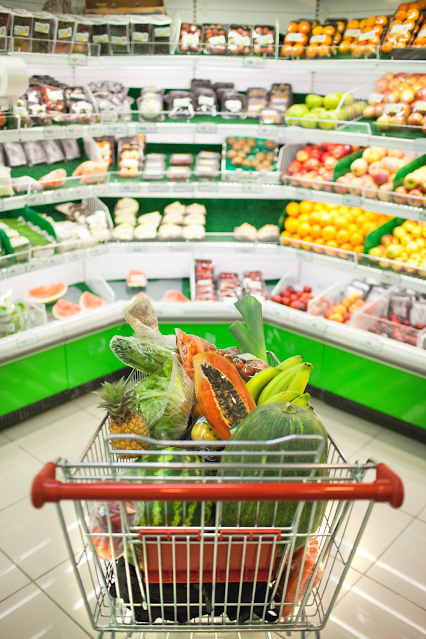The grocery industry is a dynamic and ever-evolving landscape, constantly influenced by consumer trends, technological advancements, and economic shifts.
As we embark on the journey through 2024,
entrepreneurs in this sector must stay vigilant, adaptable, and innovative to
seize opportunities and overcome challenges. In this article, we'll explore 10
key predictions for entrepreneurs in the grocery industry, offering insights
into the trends and developments shaping the market this year.
Rise of Online Grocery
Shopping
Online grocery shopping has experienced
exponential growth in recent years, and its momentum is only expected to
accelerate in 2024.
The convenience, variety, and flexibility
offered by online platforms have become increasingly attractive to consumers,
particularly in light of the COVID-19 pandemic, which spurred a surge in
e-commerce adoption. Entrepreneurs must recognize the significance of this
trend and invest in robust online platforms, efficient delivery systems, and
seamless user experiences to capitalize on the growing demand for digital
grocery shopping.
Integration of AI and
Data Analytics
Artificial intelligence (AI) and data
analytics have emerged as indispensable tools for optimizing operations and
enhancing customer experiences in the grocery industry. From predictive
analytics to personalized recommendations, AI-powered algorithms enable
retailers to anticipate consumer preferences, optimize inventory management,
and streamline logistics.
Entrepreneurs can leverage these technologies
to gain insights into market trends, customer behavior, and operational
efficiency, empowering them to stay ahead of the competition.
Focus on Sustainability
and Ethical Sourcing
Conscious consumerism drives the demand for
sustainable and ethically sourced products from grocery
wholesalers in the USA. As consumers become increasingly aware of
environmental and social issues, they seek products that align with their
values, such as organic produce, fair-trade coffee, and cruelty-free cosmetics.
Grocery retailers must respond to this demand
by prioritizing sustainability initiatives, reducing carbon footprints, and
promoting transparency in their supply chains. Entrepreneurs can differentiate
their brands by embracing sustainable practices, supporting local producers,
and offering eco-friendly alternatives to conventional products.
Expansion of Private
Label Brands
Private label or store brands are poised for
significant growth in 2024 as retailers seek to strengthen their competitive
position and boost profit margins.
By developing exclusive product lines that
offer quality, value, and innovation, grocery retailers can differentiate
themselves from competitors and build customer loyalty. Entrepreneurs have a
unique opportunity to collaborate with retailers in developing private label
brands tailored to specific market segments, leveraging their expertise in
product development, branding, and marketing to create compelling offerings
that resonate with consumers.
Rise of Ghost Kitchens
and Delivery-Only Concepts
The rise of ghost kitchens and delivery-only
concepts represents a paradigm shift in the food service industry, driven by
changing consumer preferences and technological innovation.
These virtual kitchens, which operate
exclusively for delivery orders, offer restaurateurs and entrepreneurs a
cost-effective solution to reach customers without the overhead costs
associated with traditional brick-and-mortar establishments. By leveraging
technology platforms and strategic partnerships, entrepreneurs can capitalize
on the growing demand for food delivery services and explore new avenues for
culinary innovation and business growth.
Emphasis on Health and
Wellness
Health and wellness have become fundamental
pillars of consumer behavior, influencing purchasing decisions across various
product categories, including groceries.
In 2024, consumers will continue prioritizing
products promoting physical health, mental well-being, and environmental
sustainability. Grocery retailers must respond to this trend by offering a
diverse range of health-conscious options, such as organic produce, plant-based
alternatives, and functional foods fortified with vitamins and antioxidants.
Entrepreneurs can seize opportunities in this burgeoning market by developing
innovative products, partnering with health experts, and educating consumers about
the benefits of a balanced diet and lifestyle.
Transformation of
In-Store Experiences
The traditional grocery shopping experience is
transforming due to evolving consumer preferences and technological
advancements. From interactive displays to augmented reality features, grocery
retailers leverage digital technologies to enhance the in-store experience and
engage customers in new and exciting ways.
Entrepreneurs must embrace innovation and
creativity to create immersive retail environments that combine the convenience
of online shopping with the sensory experience of physical stores. By
integrating digital elements seamlessly into the shopping journey,
entrepreneurs can captivate customers, drive foot traffic, and foster brand
loyalty in this competitive market.
Expansion of Convenience and Meal
Solutions
Convenience is king in the modern grocery
landscape, with consumers seeking quick and easy solutions to meet their busy
lifestyles.
In 2024, grocery retailers will expand their
offerings of convenience-focused products, including pre-packaged meals, meal
kits, and grab-and-go options. Entrepreneurs can capitalize on this trend by
developing innovative solutions that cater to the evolving needs of consumers,
such as healthy snacks, on-the-go breakfasts, and heat-and-eat meals.
By partnering with suppliers and leveraging
technology to streamline production and distribution, entrepreneurs can
position themselves as leaders in the convenience food market and drive growth
in this lucrative segment.
Enhanced Supply Chain
Resilience
The COVID-19 pandemic exposed vulnerabilities
in the global supply chain, prompting grocery retailers to reevaluate their
sourcing strategies, logistics operations, and inventory management practices.
In 2024, businesses will prioritize resilience, agility, and adaptability in
their supply chain strategies, leveraging technology and data analytics to
mitigate risks.
Entrepreneurs can support these efforts by
offering innovative solutions for inventory optimization, demand forecasting,
and supplier collaboration, enabling retailers to enhance supply chain
visibility, reduce lead times, and ensure product availability.
Adoption of Contactless
Payment Solutions
Contactless payment solutions have emerged as
a preferred transaction method for consumers, offering speed, convenience, and
security at the point of sale.
In 2024, grocery retailers will accelerate the
adoption of contactless payment technologies, including NFC-enabled cards,
mobile wallets, and QR code payments, to accommodate changing consumer
preferences and hygiene concerns. Entrepreneurs can capitalize on this trend by
offering seamless and secure payment solutions that integrate seamlessly with
existing POS systems, enhancing the checkout experience and improving
operational efficiency.







